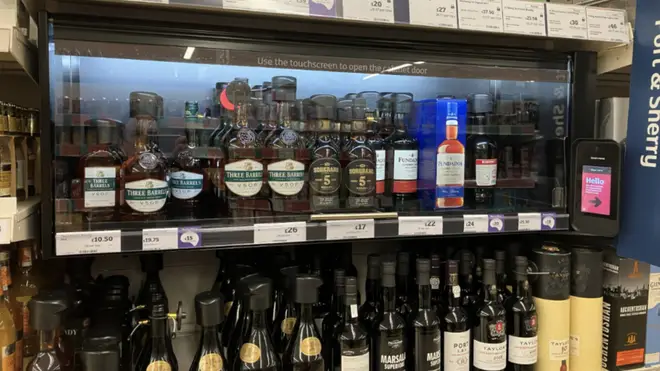This website uses cookies so that we can provide you with the best user experience possible. Cookie information is stored in your browser and performs functions such as recognising you when you return to our website and helping our team to understand which sections of the website you find most interesting and useful.
Sainsbury’s locks up booze in AI-enabled cabinets
Sainsbury’s has installed AI-enabled drinks cabinets in some of its stores in order to prevent shoplifters targeting expensive bottles of booze.

The new self-locking ‘freedom case’ cabinets, which are made by Indyme Smart Response, require customers to go through a four-step process via the touchscreen, and in-built speakers before they can access the drinks themselves.
The advantage is that it allows customers to serve themselves rather then depend on in-store staff, which provides a more satisfactory experience, while the built-in sensors can track activity to identify suspicious behaviour in real time.
This includes an ‘Active Deterrence’ system, which alerts in-store staff to any suspicious activity. According to Indyme, retailers can access detailed data, photos and video of suspicious shopper or stocking events, which is activated if the doors are open for too long or if anything inside has been moved.
The drinks inside the cabinet include expensive bottles of whisky, along with port and marsala wine.
The cabinets aim to provide a solution that helps retailers while not putting customers off, following research from Indyme using using mystery shoppers that showed that around 63% of customers have been dissatisfied with traditional locked cabinets in-store – mainly due to having to wait for staff – and around 43% will not use them.
A Sainsbury’s spokesperson confirmed the version was being trialled in a small number of store, and that it does not require any customer information, data, or a loyalty card.
“We regularly review security measures in our stores and are currently trialling cabinets in a small number of branches,” the spokesperson said.
The move follows one Tesco supermarket in South London padlocking its Champagne and spirits fridges in a bid to protect it from shoplifters, with customers required to ask a member of staff for assistance if they wanted to make a purchase.
It came after data published by Statista showed shoplifting offences in England and Wales had risen since the pandemic, up 150% since 2020-21, although they remain 11% below the 2017-18 peak.
Research from the British Retail Consortium’s (BRC) annual survey found that shoplifting cost retailers about £1.8billion in the latest year – the first time it has surpassed the £1billion mark.


